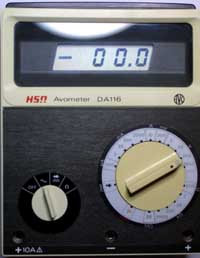 A digital AVO with a liquid crystal display of 3½ digits.
Features the HSΩ range, which just measures resistance,
but does so more quickly than the normal Ohms range.
The "HS" stands for High Speed.
A digital AVO with a liquid crystal display of 3½ digits.
Features the HSΩ range, which just measures resistance,
but does so more quickly than the normal Ohms range.
The "HS" stands for High Speed.
| Ancient AVOs |
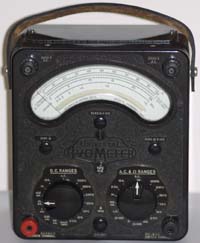
The classic British engineer's multimeter.
I have three of these, one of which has suffered damage at some time by getting damp. The cases are Bakelite, the dials have glass over them and the handles are leather (nowadays all those parts would be just ordinary plastic). Internally, the shunts, multipliers and current transformers are all made with brass and copper, and assembled by hand. I've got a box and manual for one of them, too. AVO International.
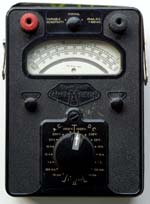
As if the Model 8 isn't heavy enough, here's a heavy duty version of the classic AVO. It's a much less common version, smaller than the standard instrument, with just a single knob for selecting ranges. It also has just two terminals for the test leads (the Model 8 has four). There is a small selector switch for use with the “One Ohm Resistance Range Extension Unit”. My example has been dropped, broken, and carefully mended with Araldite epoxy glue.
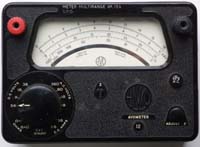
This very unusual AVO was designed for use on vehicle electrical systems, and has accessories to match. The voltage ranges are 9, 18 and 36V DC, which match nicely with 6, 12 and 24V battery charging systems (a 12V lead-acid car battery will be charged to slightly more than 12V, probably around 14.8V). The current ranges are 3.6A and 36A, much heavier than the 250μA range of the Model 8. This meter comes with a rugged leather case containing probes and optional high-current shunts.
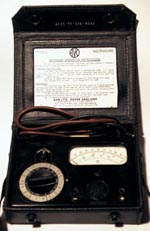
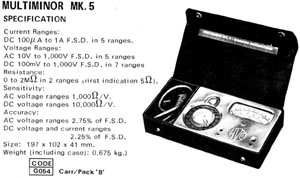
This is a smaller version of the AVO meter, complete with leather case and test leads. My example is in black bakelite, but they were also available in a very fine grey finish (as shown in the Henry's Radio advertisement). The sensitivity of the instrument is 10,000Ω/Volt, which is half that of the full-size Model 8. This means that the meter movement in the Multiminor will draw 100μA from the circuit under test, at full scale deflection. The AVO Multiminor was advertised in Practical Television (September 1961, p591) for £9:10s (that's £9.50 in decimal). Now, that would have been quite a high price at the time, given that a 21-inch TV picture tube was priced at £7:15s (£7.75). Some models had brown leather cases, while other more recent cases were vinyl. The Henry's Radio advertisement doesn't show a price for this meter.
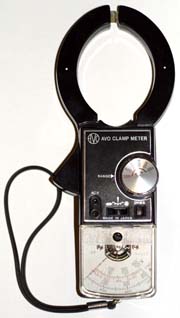
This AVO is primarily designed to measure large AC currents, but can also measure voltage and resistance. The “jaws” of the clamp meter are opened by squeezing the trigger on the left-hand side. Once clamped around a cable, the meter (in AC current mode) acts like a transformer. A current is induced in the secondary of the transformer, according to the current flowing in the primary. This induced current drives the meter. The full-scale current ranges are 300A, 600A and 1200A, while the voltage ranges are 150V, 300V, and 600V. The meter can't measure DC voltage or current at all, but to measure Ohms, an add-on probe can be used.
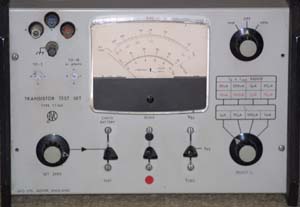
AVO made other types of instruments than just multimeters; this example is a test set for transistors. It can measure a transistor's gain, leakage and offset voltage. Power is supplied by two 9V batteries.

Much smaller than the TT166, this AVO transistor tester works with the transistor in-circuit. It was mentioned in the May 1973 issue of Practical Wireless (p. 56), where the price is given at £17.50 +VAT. Allowing for inflation, this is roughly equivalent to £175.00 in 2011.
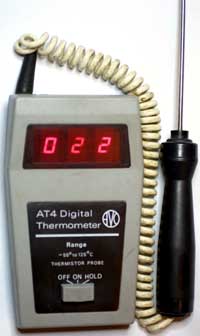
A handy little digital thermometer for checking those heatsink temperatures.
Measuring range is -55°C to +125°C.
Powered by a PP3 type 9V battery.
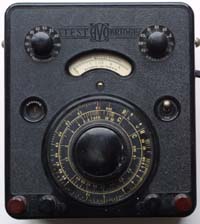
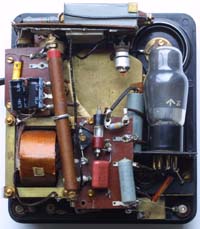
This instrument is the traditional Wheatstone Bridge, used to measure resistance and capacitance. The single valve is a triode, type L63, in an octal valveholder.
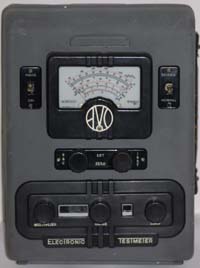
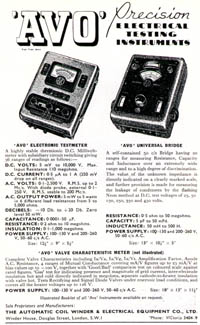
A strange AVO test gadget based on valves. I think it works as a valve voltmeter, but like the Model 8, it has many functions. One of the modes makes it into a wattmeter, and in that mode it has selectable load impedances. All the range-switching information appears in the two windows at the bottom, back-lit by small lamps inside the instrument. The control knobs have transparent plastic discs attached, with the mode and range information engraved on them in black.
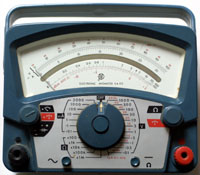
Another unusual model, the Electronic Avometer (EA113) incorporates an amplifier to increase the sensitivity of the instrument. It could be used on high impedance circuits without affecting either the operation of the circuit or the reading of the meter. The ordinary AVOs could not do this, but we tend to forget these details nowadays when all multimeters have sensitive amplifiers. It has an unusual resistance range, too, which works in the opposite direction to normal analog meters, with zero Ohms on the left and infinity on the right. The Ohms adjustment control must be set (with the probes apart) to infinity, instead of the usual adjustment to zero with the probes shorted. In addition to that, the red terminal is positive when measuring Ohms, whereas on a normal analog meter it would be negative on resistance ranges. In most DC ranges, the meter can be set to centre-zero instead of having zero on the left. In this mode, the knob on the right is used to adjust the pointer to an accurate zero in the middle of the scale. The scale is marked 1-100 in black and 50-0-50 in red, for use in centre-zero mode. This meter also has a wonderfully colourful case, in blue instead of AVO's usual black. Takes four AA batteries.
An early digital AVO with a nixie tube display. Runs off internal rechargeable battery pack and has lift-open flap on the front for access to calibration controls. Unusual row of piano-key controls for on/off and range selection. The biggest of the digital AVOs, it's as big as the original Model 8, although not made of Bakelite.
 A digital AVO with a liquid crystal display of 3½ digits.
Features the HSΩ range, which just measures resistance,
but does so more quickly than the normal Ohms range.
The "HS" stands for High Speed.
A digital AVO with a liquid crystal display of 3½ digits.
Features the HSΩ range, which just measures resistance,
but does so more quickly than the normal Ohms range.
The "HS" stands for High Speed.
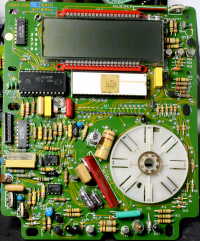
Another digital AVO with a liquid crystal display of 3½ digits, but this time featuring auto-ranging. Also has three buttons for range change up/down and range hold. Takes four C-size batteries.
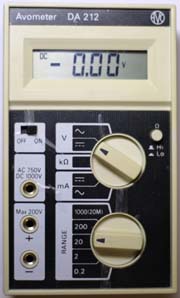


An AVO with an LCD instead of the traditional moving-coil pointer. We go back to a manual range setting control with this model. It's also much smaller than the earlier digital AVOs, almost as small as a modern DVM. It has the same 3½ digit display as the other digital AVOs. Runs on four AA-size batteries.
Return to the Old Sad Things page
Return to John Honniball's home page
Copyright © 1997-2009 by John Honniball. All rights reserved.